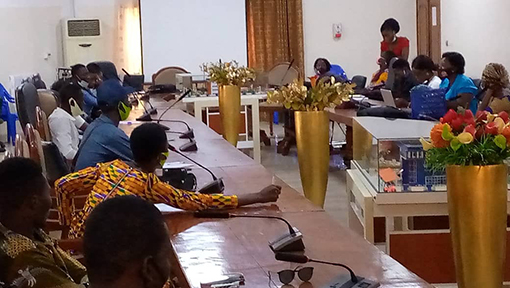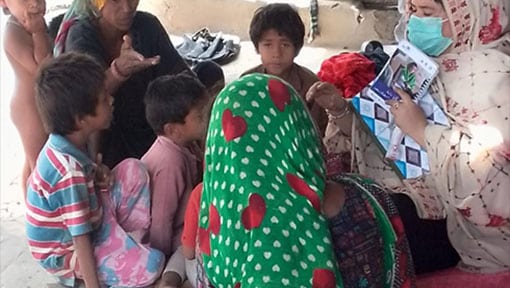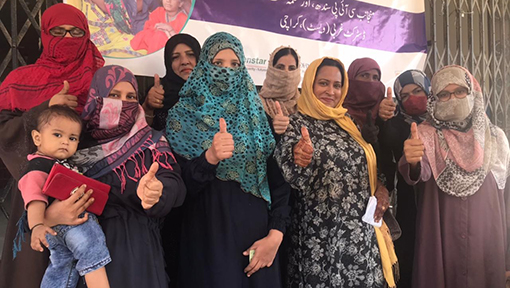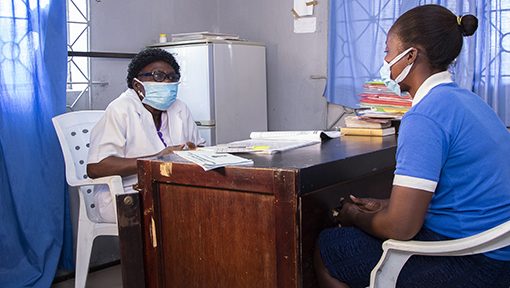Diffusion Helps Young Transformational Leaders Expand Their Reach Across Benin
Contributors: Hugues Gnahoui, Fatima Sow, and Sarah Brittingham

Training of Young Transformational Leaders on the AYSRH National Multisectoral Strategy in Benin.
It can take up to nine years for an evidence-based intervention to be widely accepted and scaled (Milat et al. 2014), but The Challenge Initiative (TCI) is having success with scaling interventions through what it calls diffusion. Intentional, behind-the-scenes activities often lay the groundwork for diffusing interventions to cities that receive no direct TCI coaching or financial support. These activities might include, for example, evaluating interventions for possible scalability, adapting interventions to the context as necessary and sharing results with possible adopters and partners to promote the further scale up of a promising intervention. TCI’s Young Transformational Leaders (Les Jeunes Leaders Transformationnels or JLT) is an advocacy approach from Francophone West Africa that is set to triple its reach in Benin as a result of an innovative partnership with a local youth group.
JLT is made up a committed cadre of youth on a mission to advocate for a supportive environment for adolescent and youth sexual and reproductive health (AYSRH) that is well-resourced and meaningfully engages youth in governance. This next generation of leaders works alongside decision-makers to inform policies, laws and programs, ensuring youth voices are taken into account and decision-makers are held accountable for their commitments to youth.
Before adopting the JLT approach in nine municipalities, UCOZ, Benin, was committed to AYSRH, at least on paper. But in reality, this often felt like business as usual – youth representation in which youth were deferential, rarely interacted with authorities, and only took action when called upon. In other words, youth were not meaningfully engaged.
TCI partnered with OSV/Jordan, a local, community-based NGO that works to promote AYSRH across Benin with peer educators and peer tutors, 10-24 year-old girls and young women who provide education and peer referrals to health facilities.
In July 2018, TCI invited OSV/Jordan to attend the needs assessment and program design workshop of the UCOZ’s AYSRH program. In November 2018, the UCOZ chapter of JLT was inaugurated at an event where national and international NGOs gathered. Between October 2018 and September 2019, these young transformational leaders worked hand in hand with the local government to 1) secure Wednesdays as a dedicated day to serve youth in all health centers across UCOZ, 2) create a municipal committee to monitor AYSRH in UCOZ, and 3) successfully advocate for the President of UCOZ’s redirection of 2 million CFA to finance coupons, removing financial barriers to family planning for UCOZ’s youth.
After seeing this work up close, OSV/Jordan was convinced the JLT approach would improve youth engagement and mobilized over 26 million CFA francs from the United Nations Population Fund in four health zones, including Abomey-Calavi. OSV/Jordan then moved to set up a national association for Young Transformational Leaders in Benin, which has since been recognized by Benin’s Ministry of Interior and Public Security. TCI provided technical support to ensure fidelity to the approach, a key aspect of diffusion. These new Young Transformational Leaders have been engaged in advocacy with municipalities, health authorities and even service providers about improving adolescent and youth-friendly sexual and reproductive health services.
The approach continues to diffuse across the country. In May 2020, the Atlantique District Health Director participated in Abomey-Calavi’s program design workshop where Roliane Yebou-Dodo, the President of the Young Transformational Leaders in Benin, presented the approach and its impact. Not long afterwards, the District Health Director requested support to implement the Young Transformational Leaders approach in six additional municipalities beyond TCI-supported cities: Allada, Toffo, Zê, Pobè, Kétou, Adja-Ouèrè. This will take the number of municipalities where Young Transformational Leaders are present from 9 to 28, more than tripling their presence across the country.
In the past, young people did not take the lead and hardly talked to the authorities. They would only take action when they were called upon. But, with the Young Transformational Leaders approach, they now know that they have to be proactive and contribute to developing their communities. They have learned to speak up, to get organized, to work and get our support, and share their results, challenges and lessons learned.”






